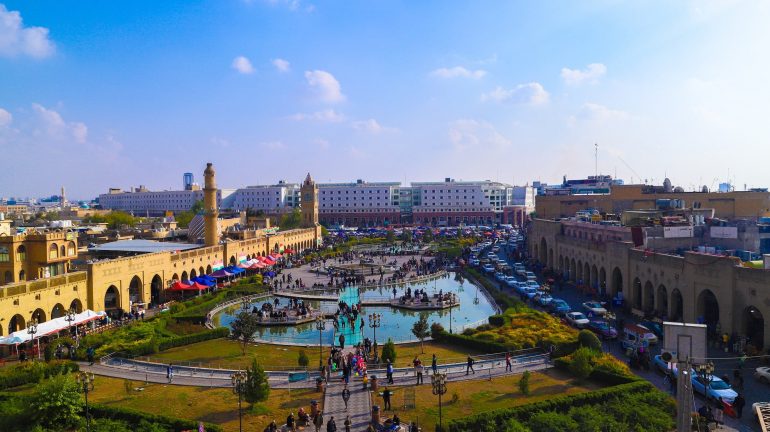More than 60,000 public sector employees in the Kurdistan Region of Iraq have petitioned Baghdad to directly administer their salaries. They seek for Baghdad to bypass the Kurdistan Region’s own finance ministry in Erbil, potentially further weakening the Kurdistan Regional Government’s (KRG) fiscal autonomy.
Now, Kurdish politicians are beginning to throw their weight behind the move.
All Kurdish parliamentary factions in Baghdad – except for the Kurdistan Democratic Party (KDP) – have co-signed on a move to have the federal government handle salary and pension payouts directly for Kurdistan Region payroll. The KDP says this move is a deliberate strategy to weaken the Kurdistan Region’s sovereignty.
Public sector workers in the Kurdistan Region are still waiting for their August salaries and benefits (with many still waiting for July), whereas their counterparts in the rest of Iraq have already been paid for September. With no oil revenues since March, the KRG blames Baghdad for not disbursing its share of the federal budget. In response, Baghdad insists that Erbil disclose credible data on its non-oil revenues and the size of its public-sector workforce before payments can commence.
Last month, a KRG team led by Prime Minister Masrour Barzani (KDP) and Deputy Prime Minister Qubad Talabani (PUK) met with Iraqi officials to discuss the salary delay. An interim agreement was reached for a 700 billion Iraqi dinar loan (roughly $535 million) to be issued in three parts. This sum is intended to help offset the wages for the 1.4 million individuals on the KRG payroll, which amount to 906 billion Iraqi dinars ($690 million) monthly.
However, this agreement doesn’t cover the full year’s salaries, causing further unease among public sector workers. This anxiety has sparked demands for direct salary payments from Baghdad. Concurrently, a massive teachers’ strike has erupted in Sulaymaniyah province, adding to the disruption of the educational landscape in the Kurdistan Region.
Shaswar Abdulwahid, head of the Kurdish opposition New Generation Movement, met the Iraqi prime minister in Baghdad on Thursday to lobby for direct salary payments. His party is one of the co-sponsors of a letter to the speaker of parliament demanding a vote on direct salary payments. Later, in an interview with NRT TV, Abdulwahid argued that such a move wouldn’t jeopardize the Kurdistan’s Region as a political entity. Instead, he believes the true risk to its status lies in ever-weaker governance and institutions.
Akram Salih, a member of the KDP’s Leadership Council, disagrees. He labeled the push for direct salary transfers from Baghdad as a political gamesmanship, especially given the upcoming parliamentary elections in the Kurdistan Region. Salih told The Citadel that any resolution to the salary crisis should be orchestrated through the KRG’s financial system, rather than being subject to arbitrary whims of politicians in Baghdad. “The Kurdistan Region is a constitutional entity, and Iraq must engage with it [constitutionally] across political, fiscal, and military dimensions,” he stated.
Karim Shukur, a Patriotic Union of Kurdistan (PUK) lawmaker in Baghdad, has a different view. He stressed their immediate concern is the people’s well-being, telling The Citadel, “If salaries aren’t paid and the public suffers, I can’t see how direct payments from Iraq would harm the structure of the Kurdistan Region.”
Prime Minister Barzani consistently labels the push for direct salary transfers as an attack on the Kurdistan Region’s constitutional rights.
Beyond the immediate crisis, regional geopolitical factors also play a role. A senior official in the Kurdistan Region told The Citadel there are suspicions within the KDP of Iranian interference in moves to systematically chip away at Erbil’s autonomy and power.
The official added, “If Iran and Shiite political groups continue this trajectory, the likelihood of Baghdad directly transferring KRG employees’ salaries could rise. Conversely, the KDP might seek talks with Iran to counter these efforts.”
The KRG’s autonomy, the extent of which had long exceeded its powers as defined in the constitution, has been in decline since the ill-fated 2017 independence referendum.
While longstanding tensions over revenue and territorial disputes between Erbil and Baghdad aren’t new, recent events have intensified these conflicts. The cessation of Kurdistan Region oil exports in March, the approval of the Iraqi Federal Budget Law, and the push to bypass Erbil for salary payments all signify mounting challenges to the Kurdistan Region’s autonomy.
Further complicating matters, a recent decision by the Iraqi Federal Supreme Court to dissolve the Kurdistan Region’s legislature has effectively halted the region’s legislative process. This has relegated the KRG to a caretaker administration role. Long-delayed Kurdistan Region elections are slated for February next year.
Internal discord within the Kurdish political scene add to the tensions and lack of coherent front against steps to limit the Kurdistan Region’s powers. Chronic disputes between the KDP and the PUK have put Kurdish representation in the Iraqi capital at odds, further weakening a bad hand for Kurds in Iraq.


